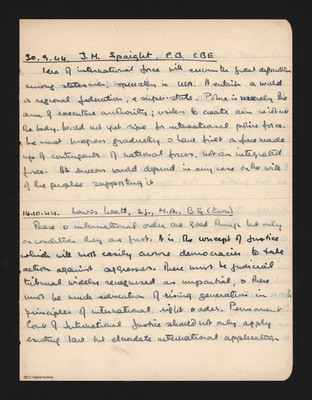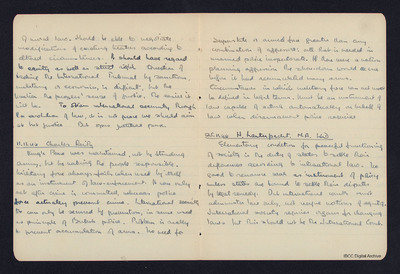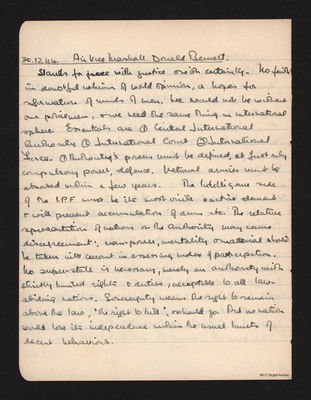Analysis of various authors ideas on international peace
Title
Analysis of various authors ideas on international peace
Description
Provides summary of views for future peace by J H Spaight, Lewis Watt, Charles Reith, Sir Hersch Lauterpacht and Air Vice Marshall Donald Bennett.
Coverage
Language
Type
Format
Four page handwritten document
Publisher
Rights
This content is available under a CC BY-NC 4.0 International license (Creative Commons Attribution-NonCommercial 4.0). It has been published ‘as is’ and may contain inaccuracies or culturally inappropriate references that do not necessarily reflect the official policy or position of the University of Lincoln or the International Bomber Command Centre. For more information, visit https://creativecommons.org/licenses/by-nc/4.0/ and https://ibccdigitalarchive.lincoln.ac.uk/omeka/legal.
Contributor
Identifier
SValentineJRM1251404v10133, SValentineJRM1251404v10134, SValentineJRM1251404v10135
Transcription
[underlined] 30.9.44. J.M. Spaight, C.B. CBE [/underlined]
Idea of international force will encounter great difficulties amongst statesmen, specially in USA. It entails a world or regional federation, a super-state. Police is merely the arm of executive authority: useless to create arm without the body. World not yet ripe for international police force. We must [indecipherable word] gradually & have first a force made up of contingents of national forces, not an integrated force. It’s success would depend in any case on the will of the peoples supporting it
[underlined] 14.10.44. Lewis Watt, S.J., M.A., B Sc (Econ) [/underlined]
Peace & international order are good things but only on condition they are just. It is the concept of justice which will most easily assure democracies to take action against aggression. There must be judicial tribunal widely recognised as impartial, & there must be much education of rising generations in principles of international rights & order. Permanent Court of International Justice should not only apply existing law but [indecipherable world] international application
[page break]
of moral law. Should be able to negotiate modifications of existing treaties according to altered circumstances. It should have regard to equity as well as strict rights. Question of tasking the International Tribunal by sanctions, military or economics, is difficult, but the [indecipherable word] the peoples’ sense of justice, the easier it will be. To obtain International security through the evolution of law, it is not peace we should aim at but justice But opus justitiae pax.
[underlined] 11.11.44 Charles Reith [/underlined]
King’s Peace was maintained, not by Standing Army, but by making the people responsible. Military force always fails when used by itself as an instrument of law-enforcement. It can only act after crime is committed, whereas police force actually prevent crime. international Security too can only be secured by prevention, in same used as principle of British police. Problem is really to prevent accumulation of aims. No need for Superstate or armed force greater than any combination of aggressors: all that is needed is unarmed police inspectorate. If there were a nation planning aggression the show-down would occur before it had accumulated many arms. Circumstances in which military force can act must be defined in legal terms. Must be an instrument of capable of acting automatically on behalf of law when disarmament police requires
[underlined] 25.11.44 H. Lauterpacht. M.A. LLD [/underlined]
Elementary condition for peaceful functioning of society is the duty of states to settle their differences according to international law. No good to renounce war as instrument of policy unless states are bound to settle their disputes by legal remedy. But international courts must administer law only, not vague notions of equity. International society requires again for changing laws but this should not be the International Court.
[page break]
[underlined] 30.12.44. Air Vice Marshall Donald Bennett. [/underlined]
Stands for peace with justice & with certainty - No faith in doubtful whim of world opinion, & hopes for information of minds of men. We would not be without our policemen, & we need the same thing in international sphere. Essentials are [circled] 1 [/circled] Central International Authority [circled] 2 [/circled] International Court [circled] 3 [/circled] International Force. [circled] 4 [/circled] Authority’s policies must be defined, at first only compulsory power, defence. National armies must be absolved within a few years. The intelligence side of the I.P.F must be its most virile & active element & will prevent accumulation of armies etc. The relative representation of nations or the authority may cause disagreement; man-power, mentality & material should be taken into account in assessing index of participation. No super-state is necessary, merely an authority with strictly limited rights & duties, acceptable to all law-abiding nations. Sovereignty means the right to remain above the law, “the right to kill”, should go. But no nation would lose its independence within the usual limits of decent behaviour.
Idea of international force will encounter great difficulties amongst statesmen, specially in USA. It entails a world or regional federation, a super-state. Police is merely the arm of executive authority: useless to create arm without the body. World not yet ripe for international police force. We must [indecipherable word] gradually & have first a force made up of contingents of national forces, not an integrated force. It’s success would depend in any case on the will of the peoples supporting it
[underlined] 14.10.44. Lewis Watt, S.J., M.A., B Sc (Econ) [/underlined]
Peace & international order are good things but only on condition they are just. It is the concept of justice which will most easily assure democracies to take action against aggression. There must be judicial tribunal widely recognised as impartial, & there must be much education of rising generations in principles of international rights & order. Permanent Court of International Justice should not only apply existing law but [indecipherable world] international application
[page break]
of moral law. Should be able to negotiate modifications of existing treaties according to altered circumstances. It should have regard to equity as well as strict rights. Question of tasking the International Tribunal by sanctions, military or economics, is difficult, but the [indecipherable word] the peoples’ sense of justice, the easier it will be. To obtain International security through the evolution of law, it is not peace we should aim at but justice But opus justitiae pax.
[underlined] 11.11.44 Charles Reith [/underlined]
King’s Peace was maintained, not by Standing Army, but by making the people responsible. Military force always fails when used by itself as an instrument of law-enforcement. It can only act after crime is committed, whereas police force actually prevent crime. international Security too can only be secured by prevention, in same used as principle of British police. Problem is really to prevent accumulation of aims. No need for Superstate or armed force greater than any combination of aggressors: all that is needed is unarmed police inspectorate. If there were a nation planning aggression the show-down would occur before it had accumulated many arms. Circumstances in which military force can act must be defined in legal terms. Must be an instrument of capable of acting automatically on behalf of law when disarmament police requires
[underlined] 25.11.44 H. Lauterpacht. M.A. LLD [/underlined]
Elementary condition for peaceful functioning of society is the duty of states to settle their differences according to international law. No good to renounce war as instrument of policy unless states are bound to settle their disputes by legal remedy. But international courts must administer law only, not vague notions of equity. International society requires again for changing laws but this should not be the International Court.
[page break]
[underlined] 30.12.44. Air Vice Marshall Donald Bennett. [/underlined]
Stands for peace with justice & with certainty - No faith in doubtful whim of world opinion, & hopes for information of minds of men. We would not be without our policemen, & we need the same thing in international sphere. Essentials are [circled] 1 [/circled] Central International Authority [circled] 2 [/circled] International Court [circled] 3 [/circled] International Force. [circled] 4 [/circled] Authority’s policies must be defined, at first only compulsory power, defence. National armies must be absolved within a few years. The intelligence side of the I.P.F must be its most virile & active element & will prevent accumulation of armies etc. The relative representation of nations or the authority may cause disagreement; man-power, mentality & material should be taken into account in assessing index of participation. No super-state is necessary, merely an authority with strictly limited rights & duties, acceptable to all law-abiding nations. Sovereignty means the right to remain above the law, “the right to kill”, should go. But no nation would lose its independence within the usual limits of decent behaviour.
Citation
“Analysis of various authors ideas on international peace,” IBCC Digital Archive, accessed November 5, 2024, https://ibccdigitalarchive.lincoln.ac.uk/omeka/collections/document/22184.
Item Relations
This item has no relations.



